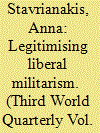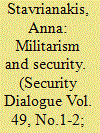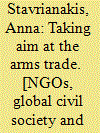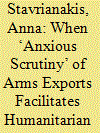|
|
|
Sort Order |
|
|
|
Items / Page
|
|
|
|
|
|
|
| Srl | Item |
| 1 |
ID:
164436


|
|
|
|
|
| Summary/Abstract |
What are the politics of, and prospects for, contemporary weapons control? Human rights and humanitarian activists and scholars celebrate the gains made in the UN Arms Trade Treaty as a step towards greater human security. Critics counter that the treaty represents an accommodation with global militarism. Taking the tensions between arms transfer control and militarism as my starting point, I argue that the negotiating process and eventual treaty text demonstrate competing modes of militarism. Expressed in terms of sovereignty, political economy, or human security, all three modes are underpinned by ongoing imperial relations: racial, gendered, and classed relations of asymmetry and hierarchy that persist despite formal sovereign equality. This means human security is a form of militarism rather than the antithesis of it. Drawing on primary sources from negotiations and participant observation with actors involved in the campaign for the ATT, the argument challenges the idea that human security has scored a victory over militarism. It also complicates our understanding of the nature of the accommodation with it, demonstrating the transformation as well as entrenchment of contemporary militarism. The argument reframes the challenges for controlling weapons circulation, placing the necessity for feminist, postcolonial anti-militarist critique front and centre.
|
|
|
|
|
|
|
|
|
|
|
|
|
|
|
|
| 2 |
ID:
144268


|
|
|
|
|
| Summary/Abstract |
Post-cold war efforts to knit together human rights and international humanitarian law in pursuit of tougher arms transfer control reached their apogee in the UN Arms Trade Treaty (ATT). In contrast to dominant accounts based on human security norms, I argue that a key effect of the ATT is to legitimise liberal forms of militarism. During negotiations the US and UK governments justified their arms export practices in terms of morality, responsibility and legitimacy. More broadly their arms transfer practices are explained away by reference to national regulatory regimes that exceed the standards set out in the ATT. Arms transfers to Egypt and intra-Western transfers illustrate the way these justifications and regimes serve to shield US–UK weapons transfers and use from scrutiny and accountability. Rather than signalling the victory of human security, the ATT is better understood as facilitating the mobilisation of legitimacy for contemporary liberal forms of war fighting and war preparation.
|
|
|
|
|
|
|
|
|
|
|
|
|
|
|
|
| 3 |
ID:
157917


|
|
|
|
|
| Summary/Abstract |
While attention to security has grown exponentially over the last few decades, militarism – the preparation for and normalization and legitimation of war – has not received the widespread and sustained focus it warrants in mainstream or critical circles. Rather than stake a claim for one concept over the other, however, this article – and the special issue to which it serves as an introduction – asks how we are to understand the relationship between security and militarism, both as analytical tools and as objects of analysis. We examine, first, what analytical and political work militarism and security do as concepts, and how they can be mobilized methodologically; second, what the possibilities are of fruitful exchange between knowledges produced about these concepts or practices; and, third, what the limits are of militarism and security. In the process, we address the shifts in the world that international relations and its related subfields study; shifts in the institutional framing and materiality of fields and subfields of research; and shifts in how international relations studies the world. Read together, the contributions to the special issue make the case for a reinvigorated focus on the mutual co-constitution of militarism and security.
|
|
|
|
|
|
|
|
|
|
|
|
|
|
|
|
| 4 |
ID:
105006


|
|
|
|
|
| Publication |
2011.
|
| Summary/Abstract |
Small arms feature prominently on the post-Cold War international security agenda as the common factor in a range of forms of organized violence. The dominant mode of understanding is focused on human security and the links between conflict, security and development. Yet small arms control efforts are failing to live up to their promise. In attempting to remedy this, scholars argue that small arms control requires better conceptualization and operationalization. This article engages with the conceptualization of small arms control, arguing that small arms control serves to reproduce imperial relations in a number of ways. It is characterized by four key analytical themes - the blurring of the distinction between state, non-state and civilian actors; the increasingly fuzzy line between conflict and crime; the pacific nature of development; and the desirability of a Weberian monopoly on violence - that are derived from an idealized reading of the European historical experience and applied to the contemporary South. This conceptual Eurocentrism is furthered by the exclusion of wider questions of the world military order and militarism through a geographical and technological selectivity and the absence of a single analytical frame, as well as North-South hierarchies in the institutional formation of policymaking. Overall, small arms control serves to reproduce the South as a site of benevolent Northern intervention, contributing to the mutual constitution of both.
|
|
|
|
|
|
|
|
|
|
|
|
|
|
|
|
| 5 |
ID:
104835


|
|
|
|
|
| Publication |
London, Zed Books, 2010.
|
| Description |
x, 214p.
|
| Standard Number |
9788182910959
|
|
|
|
|
|
|
|
|
|
|
|
Copies: C:1/I:0,R:0,Q:0
Circulation
| Accession# | Call# | Current Location | Status | Policy | Location |
| 056101 | 382.456234/STA 056101 | Main | On Shelf | General | |
|
|
|
|
| 6 |
ID:
161668


|
|
|
|
|
| Summary/Abstract |
How is it that the UK government continues to export weapons to Saudi Arabia for use in the war in Yemen, despite an explicit commitment to international humanitarian law (IHL)? And how is it that the High Court recently dismissed a case of judicial review, confirming that the government was ‘rationally entitled to conclude’ that arms exports pose no clear risk to IHL in Yemen? In what follows, I explain how a flexible interpretation of risk, reliance on secret information, and deference of the Court to the executive serve to facilitate rather than restrict arms exports. The judges’ decision provides a stamp of approval to an arms export policy that has directly contributed to the deaths of thousands of civilians in Yemen. Attention to the Saudi/Yemen case shows the political and legal manoeuvring that goes into managing the contradictions in government arms export policy.
|
|
|
|
|
|
|
|
|
|
|
|
|
|
|
|
|
|
|
|
|